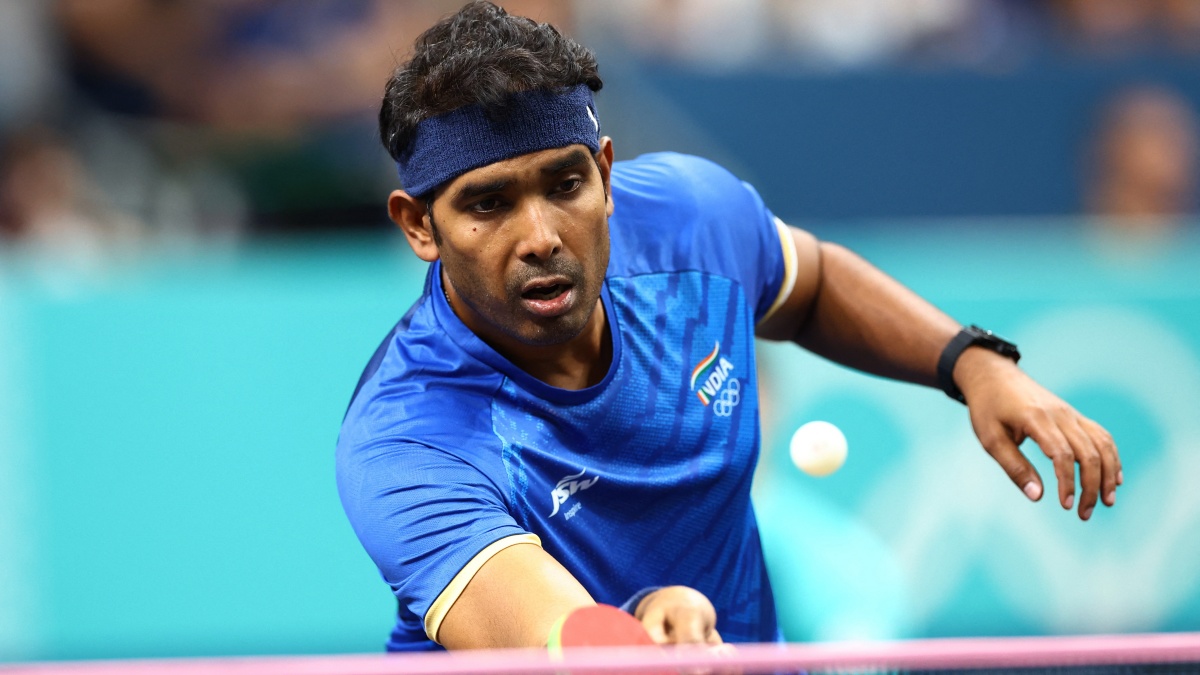As the Indian Men’s Table Tennis team fell 0-3 in the Round of 16 to reigning Olympic champions China, it marked the possible end of one of the most glorious chapters in Indian sport history.
Paris Olympics: News, schedule, medals tally and more
Indian fans were left with a bittersweet mix of pride and melancholy, when Achanta Sharath Kamal took a moment to bid adieu to the crowd, after losing to Fan Zhendong of China. This is the story of a man who not only redefined table tennis in India, but also left an indelible mark on the international stage.
It was fitting that Sharath’s last Olympic showdown would be against the best of them all. After the pairing of Harmeet Desai and Manav Thakkar lost the opening doubles fixture, Sharath took on newly crowned Olympic singles champion Fan Zhendong.
In typical Sharath fashion, he did not go down quietly. Each rally was a testament to his enduring skill and sheer willpower. The scoreline of 1-3 belies the intensity of the contest; it was a battle that could have swayed either way, with the veteran pushing the young Chinese star to his limits.
Even in defeat, Sharath Kamal was magnificent—resolute, graceful, and fiercely competitive.
With seven Commonwealth Games gold medals, two bronze medals at the Asian Games, and 10 national championships, Sharath is undoubtedly the greatest table tennis athlete India has ever produced.
Impact Shorts
More ShortsBut Sharath Kamal’s influence goes beyond his personal achievements. He is the architect of Indian table tennis’ golden era. Before his landmark victory in Men’s singles at the 2006 Commonwealth Games, Indian table tennis was an afterthought on the global stage, overshadowed by the prowess of Asian and European giants. Sharath singlehandedly changed this narrative, inspiring a generation of players to dream big.
Under his leadership, the Indian team, both men and women, have grown stronger. The status of Indian table tennis has changed from underdogs to serious contenders. His victories have brought much needed attention to the sport, bringing in government funding, sponsorship and an influx of young talent inspired by his achievements.
As Sharath potentially steps away from the Olympic stage, he leaves a void in Indian table tennis that cannot be easily filled. His departure marks the end of an era – one where the sport reached heights that seemed unassailable. But while he will be sorely missed, the legacy he leaves behind is one of hope. The foundations are now strong for the next generation to take India to the next level.
Make no mistake — Sharath Kamal’s involvement in Indian table tennis is far from over. As India’s top player, he will likely continue competing internationally. Beyond his own career, Sharath mentors rising stars like Manush Shah, who recently defeated World No. 13 Jang Woojin and ranks World No. 16 in men’s doubles alongside Manav Thakkar.
Sharath’s training facility in Chennai, serving as a de facto national centre, provides invaluable guidance to many Indian national team players, further solidifying his impact on the sport.
He is also the first Indian to be elected to the International Table Tennis Federation (ITTF) Athletes’ Commission, reflecting his global stature and the respect he commands in the sport.
While the future may unfold in ways we cannot yet predict, one thing is certain. Sharath Kamal’s name will forever resonate with every table tennis player, and in the memories of fans who watched him script history.
(The author, a National Level table tennis player, has represented the state of Maharashtra across all age groups and at the senior level. He was the Under 12 Indian national champion and participated in international tournaments at the age-group level. Additionally, he is a silver medallist at the All-India University championships, representing the University of Mumbai.
He has completed a Masters in Sport Management from Loughborough University, and is currently working with the coach education team for British Rowing, the National Governing Body for rowing in England).


)

)
)
)
)
)
)
)
)



